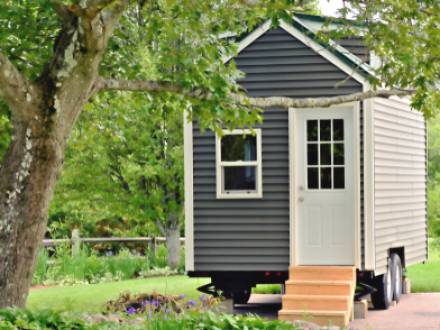Wheaton |
St. Charles |
Sycamore
 630-665-7300
630-665-7300
Do Illinois Alternative Living Arrangements Affect Custody?
 Child custody – now known in Illinois family courts as the allocation of parental responsibilities – can be impacted by any number of issues. But can a parent’s "alternative" living arrangements affect the allocation of parental responsibilities or parenting time? There are many choices today when it comes to living arrangements. A parent might choose a tiny home, a multi-generational household, a co-housing community, or any number of other options.
Child custody – now known in Illinois family courts as the allocation of parental responsibilities – can be impacted by any number of issues. But can a parent’s "alternative" living arrangements affect the allocation of parental responsibilities or parenting time? There are many choices today when it comes to living arrangements. A parent might choose a tiny home, a multi-generational household, a co-housing community, or any number of other options.
While these living arrangements may be innovative, supportive, and/or cost-effective, they may also raise questions in family court. If one parent believes the other has strayed too far from "traditional" housing, he or she may attempt to use this to gain an advantage in court. Although all Illinois family courts make decisions based on the best interests of the child, alternative housing choices can definitely introduce yet another consideration when these decisions are being made.
Decisions made for Illinois children fall under the Illinois Marriage and Dissolution of Marriage Act (750 ILCS 5/). Whether you disapprove of the housing arrangements made by your soon-to-be ex-spouse or you are the parent with an alternative housing situation, you need solid legal advice. A highly skilled Wheaton, IL parental responsibilities lawyer can help you get through this process with the best outcome possible.
What Are the Different Types of Alternative Living Arrangements?
Alternative living arrangements can refer to the type of house, the size of the house, where the house is located, or who lives in the same home. Some of the most common alternative living arrangements include:
- Tiny homes are popular right now because of their smaller carbon footprint and for financial reasons. These homes are small and efficient, designed to maximize the space.
- RV and houseboat living is similar to living in a tiny home, at least size-wise, but the owner can move as desired.
- Accessory dwelling units are small, secondary living units like mother-in-law apartments, either built on the same lot as the primary home or reimagined from an existing garage.
- Multi-generational homes may occur when grandparents have a home that is much larger than they need, so their children and grandchildren move in with them and share costs.
- Off-grid homesteads are homes that get electricity from solar panels or wind turbines, use wood to heat, and sometimes propane for cooking. These off-grid homes are not connected to city water, sewer, or other utilities like gas or internet.
- Different styles of homes that are often considered alternative or unconventional can include repurposed shipping container homes, yurts, straw bale homes, and Earthships.
What Are Some of the Typical Motivations for Alternative Living Arrangements?
Cost is usually a motivating factor in most alternative living arrangements. Particularly with today’s almost prohibitively high housing costs, parents are often looking for alternatives they can afford. Sustainability is an issue for some who want to live with a smaller environmental footprint. For others, closer connections with family and neighbors can influence their housing choices.
Will an Illinois Judge Penalize a Parent for Unconventional Housing?
Regardless of what the other parent thinks, unless he or she can prove that the unconventional housing is harming the child, the judge will give the issue little weight. As long as the child is safe, warm, and living in a healthy environment, the type of house he or she lives in is not of significant concern. Frequent moves, unstable housing, exposure to unsafe individuals, or living situations that appear temporary or financially unstable could impact the allocation of parental responsibilities.
Contact a DuPage County, IL Parental Responsibilities Lawyer
Having a strong legal advocate through your divorce and custody issues can ensure that you are not taken advantage of and that the best interests of your children are always considered. A Wheaton, IL family law attorney from Mirabella, Kincaid, Frederick & Mirabella, LLC will always work for the most positive outcome.
Our attorneys understand how judges view non-traditional arrangements. We will help you build a strong case that highlights our child’s well-being. MKFM Law serves family law clients at their offices in Kane County, DuPage County, and DeKalb County. Call 630-665-7300 to schedule your initial attorney meeting.


 Read More
Read More





